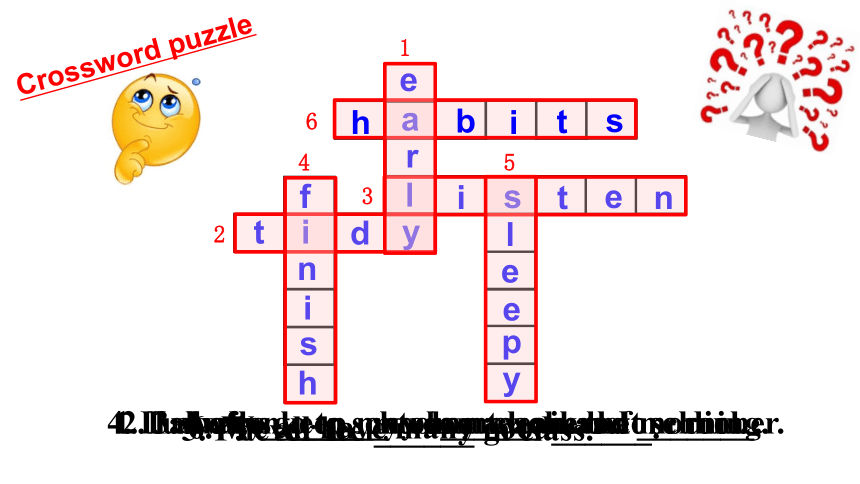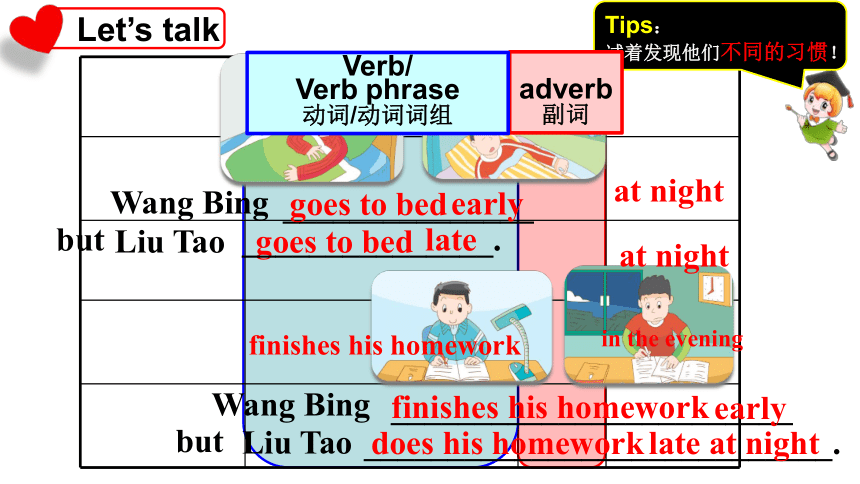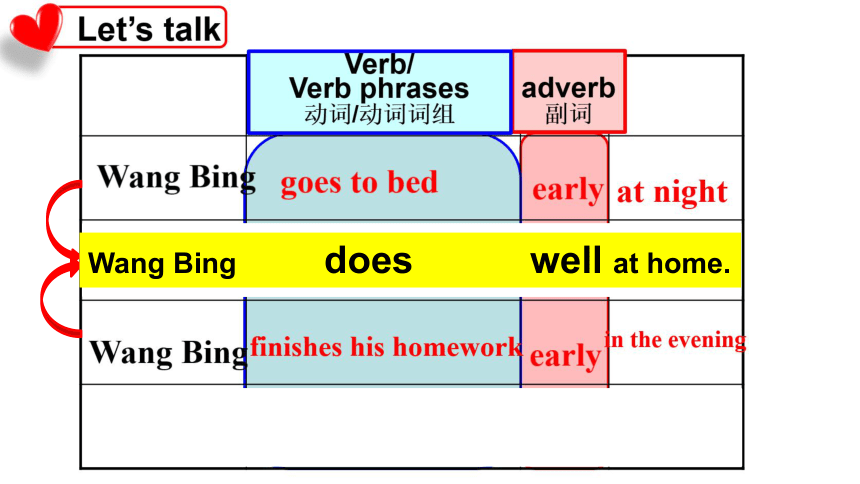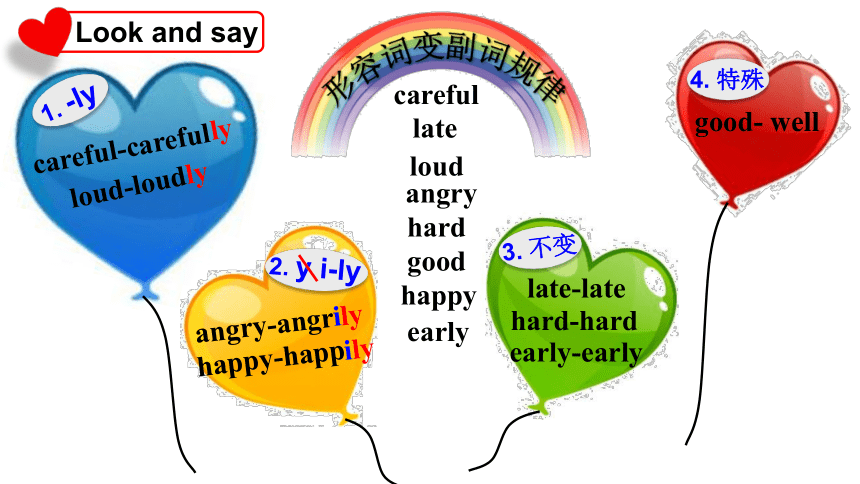Unit 2 Good habit(Grammar -Fun time)课件(共24张PPT)
文档属性
| 名称 | Unit 2 Good habit(Grammar -Fun time)课件(共24张PPT) |  | |
| 格式 | pptx | ||
| 文件大小 | 10.1MB | ||
| 资源类型 | 教案 | ||
| 版本资源 | 牛津译林版 | ||
| 科目 | 英语 | ||
| 更新时间 | 2021-05-17 08:35:16 | ||
图片预览









文档简介
Unit 2
Good habits
义务教育教科书译林小学英语六年级下册
(Period2---Grammar time and checkout time)
How to learn?
carefully
listen carefully
speak loudly
think hard
Try our best!
write carefully
look_________
e
i
s
t
e
n
a
r
l
y
t
i
d
l
e
e
y
p
f
n
s
i
h
6
3
2
1
4
5
6. We all have many good______.
3. I often ______ to my teachers at school.
2. I always keep my room clean and _______.
1. I always go to school______ in the morning.
4. I usually______ my homework before dinner.
5. I never feel______ in class.
Crossword puzzle
h
b
i
t
s
Wang Bing’s
good habits
Let’s talk
gets up early
goes to bed late
never
brushes his teeth
in the morning and before bedtime
puts his things
in order
finishes his homework before dinner
1
2
3
4
Early to bed and early to rise
makes a man healthy, wealthy and wise.
早睡早起身体好。
goes to bed early
Let’s talk
listens to teachers
at school
helps his parents
keeps his room
clean and tidy
does his homework late
goes to bed late
feels sleepy
in the morning
1
2
3
4
5
6
Liu Tao’s
habits
You shouldn’t____________, Liu Tao.
What’s your advice?
建议
do homework early
go to bed early
on time
on time
go to bed late
按时
?
?
?
?
?
?
?
?
?
?
?
?
?
?
?
?
?
?
?
?
_______________
Wang Bing
Tips:
试着发现他们不同的习惯!
Liu Tao
does his homework
Let’s talk
goes to bed
goes to bed
finishes his homework
but
Liu Tao
Wang Bing
but
_______________.
____________________________.
________________________
early
late
early
late
at night
finishes his homework
at night
in the evening
at night
adverb
副词
Verb/
Verb phrase
动词/动词词组
Wang Bing does well at home.
形容词变副词规律
careful
careful-carefully
late
late-late
loud
loud-loudly
angry
angry-angrily
hard
hard-hard
good
happy
happy-happily
early
early-early
Look and say
good- well
1. -ly
2. y i-ly
3. 不变
4. 特殊
1.
2.
3.
4.
5.
6.
Think and choose
Do you know?
部分以ly结尾的形容词
friendly 友好的
lovely 可爱的
部分词“形副同形”;
加ly后,含义不同。
late晚的、晚地
lately最近
hard努力的、努力地
hardly几乎不
I work hard.
I play computer games.
I put my things in order.
Two?truths?and?a?lie
两句真话,一句假话
Do you know me well?
I always work hard.
I usually put my things in order.
I never play computer games.
选择你认为的“假话”。
always
usually
often
sometimes
never
Think and match
always
usually
often
sometimes
never
Learning Tips:
频率副词表示动作发生的频繁程度,从always到never发生的频率由多到少。
Do you know?
Do a survey
Let’s introduce
always
usually
often
sometimes
never
A
B
C
D
E
1 Do you play computer games?
2 Do you use mobile phones or pads?
3 What do you do with mobile phones or pads?
4 Do you learn by
Suzhou Online Education Center?
What are their habits?
Listen and choose
1. Su Hai and Su Yang get up at ______ in the morning.
a. six o’clock b. six thirty c. seven o’clock
2. They help their ______.
a. classmates b. parents c. friends
3. They keep their ______ clean.
a. rooms b. schoolbags c. desks
4. What is their bad habit? ______
a b c
c. seven o’clock
c. friends
c. desks
a
Su Hai and Su Yang are good to their friends.
They help them with their homework.
their friends
watch TV
_______after school
What is their bad habit?
right
一放学就看电视
Watching too much TV is a bad habit.
Let’s think
What will happen if we…?
watch too much TV
go to bed late
feel sleepy in class
can’t listen carefully
can’t do homework
finish homework late
Vicious circle
恶性循环
is bad for eyes
He/She…
This is a bad habit.
Look and say
拖拉
Do a report
Our
habits
Who
(name)
How often
(always)
(never)
What
Rules:1 6-8人小组合作
2 每人介绍1-2种习惯
3 分工完成汇报任务
Show time
Homework
1. Make a list of your good habits and bad habits.
列一份你的好习惯和坏习惯清单。
2. Give a surprise to your mother and grandmother.
给妈妈和奶奶一个三八妇女节惊喜!
Good habits
义务教育教科书译林小学英语六年级下册
(Period2---Grammar time and checkout time)
How to learn?
carefully
listen carefully
speak loudly
think hard
Try our best!
write carefully
look_________
e
i
s
t
e
n
a
r
l
y
t
i
d
l
e
e
y
p
f
n
s
i
h
6
3
2
1
4
5
6. We all have many good______.
3. I often ______ to my teachers at school.
2. I always keep my room clean and _______.
1. I always go to school______ in the morning.
4. I usually______ my homework before dinner.
5. I never feel______ in class.
Crossword puzzle
h
b
i
t
s
Wang Bing’s
good habits
Let’s talk
gets up early
goes to bed late
never
brushes his teeth
in the morning and before bedtime
puts his things
in order
finishes his homework before dinner
1
2
3
4
Early to bed and early to rise
makes a man healthy, wealthy and wise.
早睡早起身体好。
goes to bed early
Let’s talk
listens to teachers
at school
helps his parents
keeps his room
clean and tidy
does his homework late
goes to bed late
feels sleepy
in the morning
1
2
3
4
5
6
Liu Tao’s
habits
You shouldn’t____________, Liu Tao.
What’s your advice?
建议
do homework early
go to bed early
on time
on time
go to bed late
按时
?
?
?
?
?
?
?
?
?
?
?
?
?
?
?
?
?
?
?
?
_______________
Wang Bing
Tips:
试着发现他们不同的习惯!
Liu Tao
does his homework
Let’s talk
goes to bed
goes to bed
finishes his homework
but
Liu Tao
Wang Bing
but
_______________.
____________________________.
________________________
early
late
early
late
at night
finishes his homework
at night
in the evening
at night
adverb
副词
Verb/
Verb phrase
动词/动词词组
Wang Bing does well at home.
形容词变副词规律
careful
careful-carefully
late
late-late
loud
loud-loudly
angry
angry-angrily
hard
hard-hard
good
happy
happy-happily
early
early-early
Look and say
good- well
1. -ly
2. y i-ly
3. 不变
4. 特殊
1.
2.
3.
4.
5.
6.
Think and choose
Do you know?
部分以ly结尾的形容词
friendly 友好的
lovely 可爱的
部分词“形副同形”;
加ly后,含义不同。
late晚的、晚地
lately最近
hard努力的、努力地
hardly几乎不
I work hard.
I play computer games.
I put my things in order.
Two?truths?and?a?lie
两句真话,一句假话
Do you know me well?
I always work hard.
I usually put my things in order.
I never play computer games.
选择你认为的“假话”。
always
usually
often
sometimes
never
Think and match
always
usually
often
sometimes
never
Learning Tips:
频率副词表示动作发生的频繁程度,从always到never发生的频率由多到少。
Do you know?
Do a survey
Let’s introduce
always
usually
often
sometimes
never
A
B
C
D
E
1 Do you play computer games?
2 Do you use mobile phones or pads?
3 What do you do with mobile phones or pads?
4 Do you learn by
Suzhou Online Education Center?
What are their habits?
Listen and choose
1. Su Hai and Su Yang get up at ______ in the morning.
a. six o’clock b. six thirty c. seven o’clock
2. They help their ______.
a. classmates b. parents c. friends
3. They keep their ______ clean.
a. rooms b. schoolbags c. desks
4. What is their bad habit? ______
a b c
c. seven o’clock
c. friends
c. desks
a
Su Hai and Su Yang are good to their friends.
They help them with their homework.
their friends
watch TV
_______after school
What is their bad habit?
right
一放学就看电视
Watching too much TV is a bad habit.
Let’s think
What will happen if we…?
watch too much TV
go to bed late
feel sleepy in class
can’t listen carefully
can’t do homework
finish homework late
Vicious circle
恶性循环
is bad for eyes
He/She…
This is a bad habit.
Look and say
拖拉
Do a report
Our
habits
Who
(name)
How often
(always)
(never)
What
Rules:1 6-8人小组合作
2 每人介绍1-2种习惯
3 分工完成汇报任务
Show time
Homework
1. Make a list of your good habits and bad habits.
列一份你的好习惯和坏习惯清单。
2. Give a surprise to your mother and grandmother.
给妈妈和奶奶一个三八妇女节惊喜!
